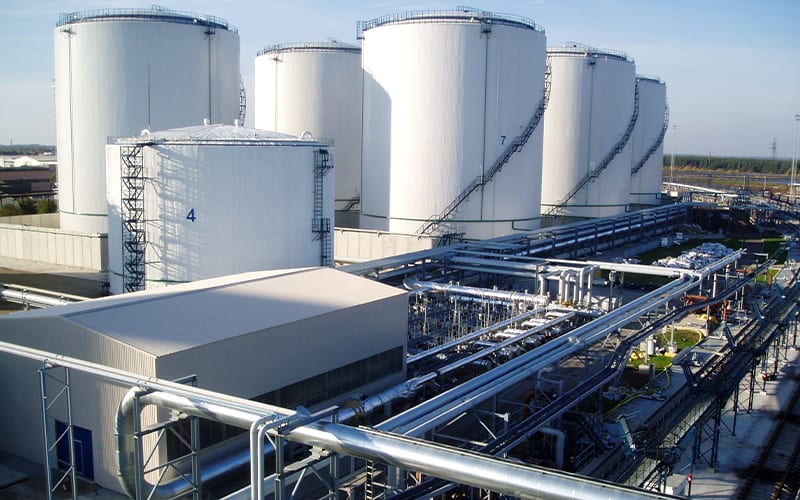The Virtual Power Plant helps reduce the costs for Liwathon E.O.S.
At the end of 2020, Liwathon E.O.S., the largest independent oil products terminal operator in the Baltic region, connected its electric heating of transport pipelines to Eesti Energia's Virtual Power Plant in order to sell surplus energy back to the grid and thus generate additional revenue.

Liwathon mainly handles heavy fuel oils, the storage and transport of which require constant heating to ensure a suitable temperature range for the products, making the technological process of the transit service provided by the company energy-intensive. They are constantly looking for options to make the operation of terminals more cost-effective through new and innovative technological solutions.
According to Gert Tiivas, Chairman of the Management Board of Liwathon E.O.S., the Virtual Power Plant will help them achieve these goals by allowing to sell the surplus energy that inevitably accompanies the technological process of the terminals back to the electricity market.
A virtual power plant can increase the efficiency of energy consumption
“The competition in the market of terminals is very intense. In order to stay competitive, we must constantly optimize the technological processes of the terminals and make their energy consumption more efficient,” Tiivas said. “This is a big challenge, as it depends on many factors, such as the price of energy carriers, the outside temperature, the chemical composition of the heavy fuel oil we receive, it’s temperature on arrival, etc. We cannot influence many of these factors, but for our part we can apply, continuously develop and improve the best possible technology and work processes. A virtual power plant makes it possible to increase the efficiency of our energy consumption, as we can sell the surplus energy that inevitably remains in the technological process of the terminals back to the market.”
Resale is possible because the electric heating modes of the pipelines can be controlled according to the virtual power plant system during the pipeline transport of fuel oil preheated to the required temperature. This enables to reduce energy costs, as part of the remaining energy can be sold back to the market.
According to Maarja Tobreluts, Head of the New Business department of Eesti Energia's Energy Trade unit, the heating equipment of Liwathon E.O.S. is a clear example of how electricity-consuming equipment can be made to earn additional income by changing its load.
A flexible energy control service allows the device owner to earn up to 15% extra revenue
“The load schedule of equipment consuming and generating electricity can be shifted over time without disturbing the main processes. This is called the flexibility of the device's energy consumption or generation. Flexibility allows the owner of the device to earn additional income by participating in maintaining the balance of the power system,” Tobreluts explained. “It was surprising for us that the oil terminals have such well-suited equipment for a virtual power plant. This provides a reason to take a closer look at industries where potentiality for flexible consumption management may not appear at first glance.”
Depending on the device, the earned income can be up to 15% of the annual electricity consumption cost of the device, and its connection costs are borne by Eesti Energia. The company does not have to make additional investments to connect.
“All companies with higher electricity consumption are welcome to contact us, even if it initially seems that this service is not for them,” Tobreluts emphasized. “Together, we can analyse the company's processes and equipment, and identify the potential for flexibility. Liwathon is a good example, where in cooperation with the company we found exceedingly suitable equipment allowing flexible consumption. The cooperation with Liwathon has been great, and the whole team has been open and aspiring to find the best solution for integrating the automatics of the equipment with the Virtual Power Plant platform.”
The use of the service is safe and under the control of the customer
When Liwathon E.O.S. joined the Virtual Power Plant, security and uninterruptedness of its core processes were of key importance. Security is ensured by the communication between the device and the VPP via a secure VPN channel, and the fact that the on-site communication with the device takes place via a suitable industrial data exchange protocol. The entire virtual power plant solution of Eesti Energia complies with the ISO/IEC 27001:2017 information security standard.
“The smoothness of core processes is the cornerstone on which our service is based. We always agree with the customer when and within what limits their electrical equipment may be adjusted. If necessary, these times and limits can always be changed in the web portal,” Tobreluts specified. “We thoroughly test the entire process to make sure it works correctly and safely on both sides. As the electricity markets are traded 24/7, the service is constantly monitored and our experts are available when required.”
Liwathon E.O.S., located in Muuga Harbour, is the largest independent terminal operator for oil products in the Baltic Sea region. The company owns four modern terminals with a total storage capacity of over one million cubic metres. Liwathon started its operations more than 20 years ago, being one of the pioneers in the liquid fuels transit and logistics sector in the Baltics.